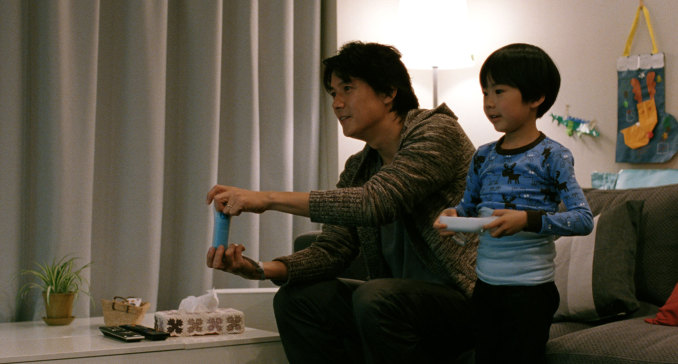

Masaharu Fukuyama is the affluent workaholic whose initial sideswiped reaction ("Now it makes sense. The story is an old one – two babies, accidentally swapped at birth, raised by families of differing social status, now faced with the heartbreaking prospect of having to exchange their six-year-olds in whom each family has invested so much energy, ambition and love. Kore-eda returns to the subject of parents and children in this beautiful, melancholic paean to paternity, which sifts through issues of nature and nurture as gently as a hand passing through drifting sand. The original title of that film was Kiseki – the Japanese word for miracle – which perfectly captured its transcendent, humanist charm. It takes Ryota, who emerges as the central character, a long time to catch up to this essential, plaintive truth, which makes him a frustrating, at times appalling and finally perfect hook on which to hang this persuasively human story.H irokazu Kore-eda's previous feature, I Wish, was a jewel of a film a tale of two young brothers torn apart by their parents' separation who put their faith in a mythical vortex created by the passing of speeding bullet trains.

For all their obvious differences, the children and adults fit together simply because they love one another. Once the pieces are in place, though, and he begins shifting your attention elsewhere - say, to a child secretly listening to his parents arguing - these differences recede, which is precisely to the story’s greater meaning. Kore-eda’s leisurely pace can sometimes feel overly deliberate here, and the obvious differences between the families, who initially seem to embody order versus chaos, at first register as excessively schematic. Slowly, over the course of months, the families meet, circling each other as together they try to figure out the future. A somewhat disheveled, nicely matched smiley set, Yukari and Yudai live with the rambunctious Ryusei and their two other young children in a small, cramped apartment tucked next to their sleepy appliance store. With the help of hospital officials who serve as self-interested brokers (it’s all for the good of the children, they intone), Ryota and Midorino arrange a meeting with the other parents, Yukari (Yoko Maki) and Yudai (Lily Franky). The story’s meticulously arranged initial calm is disturbed by a phone call that changes the family’s life: For reasons revealed only later, Keita had been swapped at birth with another boy, Ryusei (Shogen Hwang). And if that seems obvious enough to anyone watching, it’s a point that, Ryota in particular, loses sight of as the narrative unfolds, and the adults begin negotiating with one another over the fates of children, sometimes within tiny earshot. About the only things disrupting the space’s graphical harmony are the toys and Keita’s artwork scattered around the home, emphatic reminders that while he is exceptionally well behaved he’s still very much a child.
LIKE FATHER LIKE SON JAPANESE WINDOWS
The pictorial precision of the interview dovetails with the family’s reserve and air of hushed privilege and continues once the three return to their comfortable, modern apartment with its big windows and teak details. Kore-eda never overly explains his stories through the dialogue, preferring to tease out their meaning visually. Kore-eda again creates a pair of irresistible charmers whose lives are, with increasing emotional violence, upended - with polite bows, civilized conversations and hollow-sounding rationalizations - by the very adults meant to take care of them. In his last film, “I Wish,” he tells the story of two seemingly unsinkable young brothers separated by their mother and father’s bad marriage and choices: Each child lives with a different parent, having been divided up as if they were household possessions. It’s also a wedge that - day by day, hurt by hurt - transforms these loving parents into sparring partners.įamily ties wind through the work of the Japanese director Hirokazu Kore-eda, whose films include “Nobody Knows” (about four children abandoned by their mother) and “Still Walking” (about a family grieving for a dead son).

For one set of parents, Ryota (Masaharu Fukuyama) and Midorino (Machiko Ono), a comfortably middle-class couple nestled high in a glass tower, the revelation that their only son, Keita (Keita Ninomiya), isn’t a blood relation is a blow to their tiny family. It begins with the revelation that two 6-year-old boys were given at birth to the wrong families, which now need to decide on the best thing to do. The Japanese melodrama “Like Father, Like Son” turns on the kind of cruel twist - children switched at birth - that’s the stuff of tear-wringing headlines and fiction.


 0 kommentar(er)
0 kommentar(er)
